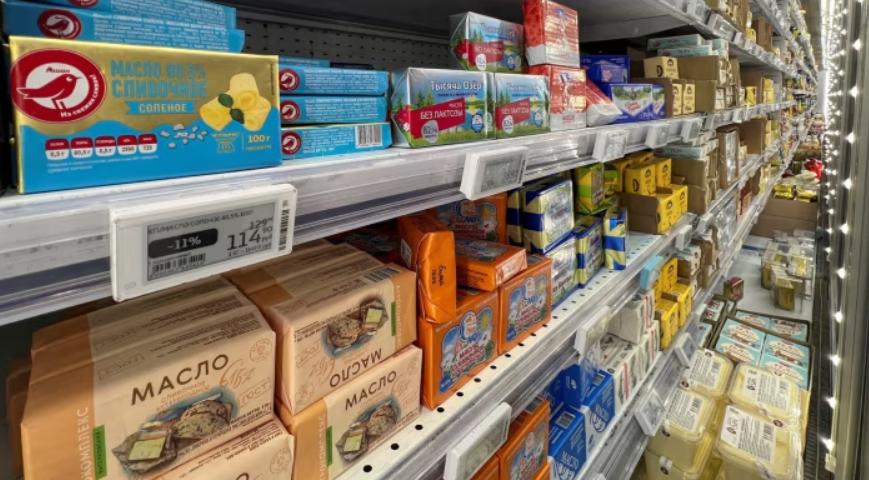
Against the complex backdrop of Russia's war economy, the butter theft highlights the far-reaching impact of inflation on daily life and the country's economy. Russian President Vladimir Putin has invested heavily in the production of weapons and ammunition to support military operations on the battlefield in Ukraine, but this has also come at the cost of a surge in livelihood costs. Security camera footage has emerged of two masked men breaking into a dairy store in Yekaterinburg, Russia, where one of them grabbed the cash register and the other made off with 20 kilograms of butter. The episode sheds light not only on food shortages, but also on the economic challenges Russia faces due to inflation.
First of all, inflation and people's livelihood difficulties. According to the central bank's forecasts, inflation could reach 8.5 percent this year, double the target. The forecast underscores a broad trend of rising consumer prices. The price of butter, for example, is up 26 percent year on year, forcing some stores to sell it in plastic boxes with magnetic locks to prevent theft. This reflects the dual pressures of shortages and falling consumer purchasing power. Putin has ordered the government to take steps to stabilize the economy and raised the benchmark interest rate to a record 21 percentage points in October. Putin, however, has shown no intention of cutting defense spending, which is expected to reach a record 13.5 trillion rubles (about $145 billion) next year. The current economic situation is a typical "overload economy", that is, the contradiction between high defense spending and the pressure on people's livelihood.
Secondly, recruitment difficulties and production bottlenecks. The surge in Russian defense spending has triggered a hiring spree for factories, especially in defense-related industries. To meet demand, many factories are operating on three shifts, driving the unemployment rate to a record low of 2.4 percent. This has prompted private companies to raise wages to attract more workers. However, despite the improvement in employment, production bottlenecks remain serious. Nabiullina, the governor of Russia's central bank, told parliament in late October that persistently high inflation showed that "demand is significantly exceeding the productive capacity of the economy," while in some industries there is not even idle equipment that can be used for production, exacerbating the economy's supply woes.
Then there is defence spending and the commodity economy. At the same time, Russia's commodity export revenue continues to decline and the ruble's exchange rate volatility against foreign currencies has increased, making it more expensive for Russia to buy the goods it needs on international markets, further pushing up the price of everyday consumer goods. In addition, sanctions by the United States and its Allies have restricted payments for Russian goods, which has kept import costs high and people's lives more stressful. Russia's domestic commodity supply chain has been restructured, but at the same time, the production chain is facing greater pressure due to the increased demand of the war. Against this backdrop, income inequality in Russia is growing.
Finally, the contradiction between the cost of capital and military production. Russia's high cost of capital is also putting extreme pressure on companies. Rodrigues Technologies CEO Sergey Chemezov said in October that high capital costs have become one of the obstacles for his company to sell weapons abroad. Putin addressed the issue in his economic speech last month and called on the government to maintain "constructive growth" in corporate lending to support the development of Russian industry. Nabiullina, however, argues that Russia's inflation problem is more complex, and that labor shortages and spending-driven economic imbalances are ultimately the root cause of soaring inflation, not borrowing costs or insufficient capacity.
To sum up, Russia's current economic situation is complex. While Putin's government continues to spend more on the war, it is having a huge negative impact on people's lives. High inflation, labor shortages, production bottlenecks, and supply chain difficulties together pose huge challenges for the Russian economy. Under such circumstances, how the government can maintain its military advantage while stabilizing the people's livelihood will be a key issue for Russia in the coming period.

報告顯示,中國電力投資加速增長,預計2024年電網基建投資將超過5300億元。
近日,市場迎來了一則引人注目的消息:工業巨頭3M公司(MMM.N)在本周五公布了其季度業績報告,隨後股價飆升至近兩年來的
最近,外媒給OpenAI算了筆賬,今年可能要血虧50億美元。
近日,巴黎奧運會和世界鐵人三項協會聯合發布了一項重大決定,宣布因塞納河水質污染問題,原定於近期進行的奧運會鐵人三項首次下
當地時間7月18日,法國巴黎發生了一起令人震驚的持刀襲警事件。
近期,一則重大消息在國際舞臺上引起軒然大波,馬來西亞宣布加入金磚國家。
調查發現,互聯網和智能手機的使用幹擾了韓國近五分之一學生的生活。